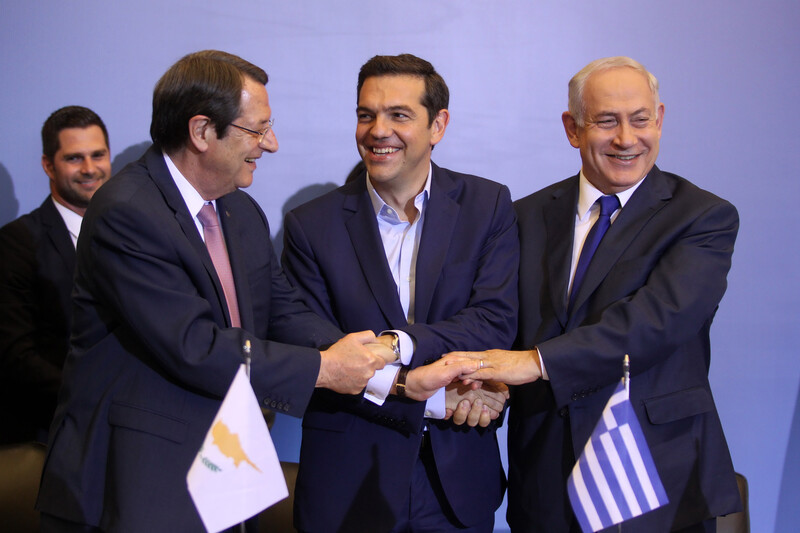EU to supply electricity to Israeli settlements
Power Suits 7 March 2018

The European Union will within a few years be supplying electricity to Israel’s settlements in the occupied West Bank and Syria’s Golan Heights, all of which are illegal under international law.
That is what will happen when a major EU-backed infrastructure project, the EuroAsia Interconnector, is completed.
This is a subsea cable system that will connect the Israeli electricity grid to Europe via Greece and Cyprus.
This “energy highway” will create “a reliable alternative route for the transfer of electric energy to and from Europe,” according to the project website.
The European Union has given the initiative high-level support as a “project of common interest” that will “allow for bidirectional transmission of electricity” between EU states and the Israeli grid.
The leaders of Greece and Cyprus signed an agreement in June 2017 with Israeli Prime Minister Benjamin Netanyahu, blessing the EuroAsia Interconnector and other joint energy projects.
Last month a $4.3 billion tender was published seeking contractors to build the EuroAsia Interconnector.
Supplying settlements
When the system is completed by 2021, European electricity will help fuel Israel’s impunity for international crimes, according to the Palestinian BDS National Committee (BNC), the steering group of the international boycott, divestment and sanctions campaign for Palestinian rights.
“This would connect Israel’s illegal settlements with the European electric grid,” putting the EU in violation of its own policies and its obligation not to recognize or assist Israel’s illegal actions, the BNC notes in a briefing document published last month.
The BNC notes that since large natural gas reserves were discovered in the late 1990s in the waters of the Eastern Mediterranean, Israel has been involved in disputes over who should control them.
“By purchasing gas from Israel, whether directly or indirectly, the EU would become complicit in Israel’s illegal annexation of the occupied Palestinian territory, its illegal settlements and the war crime of pillage of Palestinian natural resources,” the briefing states.
Keeping Gaza in the dark
Human rights defenders have previously concluded that Israel’s ongoing maritime blockade of the Gaza Strip is motivated by its desire to prevent Palestinians exploiting the gas reserves off Gaza’s shores.
“Israel not only denies Palestinians access to gas reserves off the coast of Gaza but has also illegally exploited these resources for its exclusive benefit while depriving Palestinians of revenues,” the BNC states.
Meanwhile, Gaza continues to suffer acute, life-threatening electricity shortages, compounded by Israel’s “refusal to live up to its responsibilities as an occupying power.”
Palestinian efforts to develop the gas reserves off Gaza continue to falter. This week, Royal Dutch Shell announced it was giving up its stake in the Gaza Marine gas field, leaving the Palestinian Authority with no international partner.
Israel also recently threatened Lebanon over the Beirut government’s plans to develop its maritime gas fields.
“EU gas purchases from Israel will foment armed conflict between Israel and Lebanon, which in turn threatens Europe’s energy security arising from interruptions of supplies should war break out,” the BNC warns.
It also says EU investors face a “high probability of financial losses due to the unstable and unpredictable security situation.”
According to the BNC, Israel has faced difficulties securing investment in some of its gas projects due to concerns over potential Palestinian and Lebanese legal challenges, security, cost and geological instability.
But the EU has continued to be a reliable source of support for Israel.
Greece’s Energean Oil & Gas has just announced that it has secured $1.27 billion in financing to develop the Israeli-controlled Karish gas field.
That deal is being underwritten by the French banks Natixis and Société Générale, and Israel’s Bank Hapoalim. Like all major Israeli banks Hapoalim is deeply complicit in illegal colonization of occupied territory.
Dependence
“Israel’s approach for accessing the European gas market has been to forge an alliance with Cyprus and Greece, spanning economic, political and military cooperation,” the BNC states. “This has come at the expense of both countries’ historic support for Palestinian rights.”
Greece’s ostensibly radical left Syriza government – headed by Alexis Tsipras – has continued to tighten its embrace of Israel.
But elite collaboration with Israel at the expense of Palestinians is not restricted to Israel’s European allies.
The Israeli and American partners developing the so-called Leviathan field announced Wednesday that they are ready to start supplying Jordan with gas through direct pipelines and via Egypt.
This will bring online a $10 billion deal Jordan signed to buy Israeli-supplied gas in the face of staunch popular opposition.
Also last month, Egypt’s ruling junta signed a deal to buy $15 billion worth of gas from Israel.
That came after news that Abdulfattah al-Sisi, the army chief who seized power in a 2013 military coup, has been allowing Israel to carry out airstrikes against insurgents in Egypt’s Sinai Peninsula.
“This dependence bodes ill for Egyptians, who will find their politics circumscribed by Israel’s, and Palestinians, for whom any normalization of Israel’s role and position in the region and the world is a normalization of occupation and oppression that shows no sign of ending,” The Electronic Intifada’s Omar Karmi has commented.
Climate betrayal
In addition to the human rights harm the EU is doing by bringing Israel into its energy infrastructure, the BNC points out that the 28-member bloc is also betraying its commitments to fight climate change by continuing to make massive investments in fossil fuel infrastructure.
The BNC is urging the EU and the governments of Greece and Cyprus to scrap the EuroAsia Interconnector, cancel a feasibility study for a planned Eastern Mediterranean gas pipeline and warn companies and investors of the legal, economic and security risks involved.
Given the history of EU support for Israel’s violations of international law, it will likely be up to campaigners in Europe to apply pressure on companies and other stakeholders to end their complicity.



Geen opmerkingen:
Een reactie posten